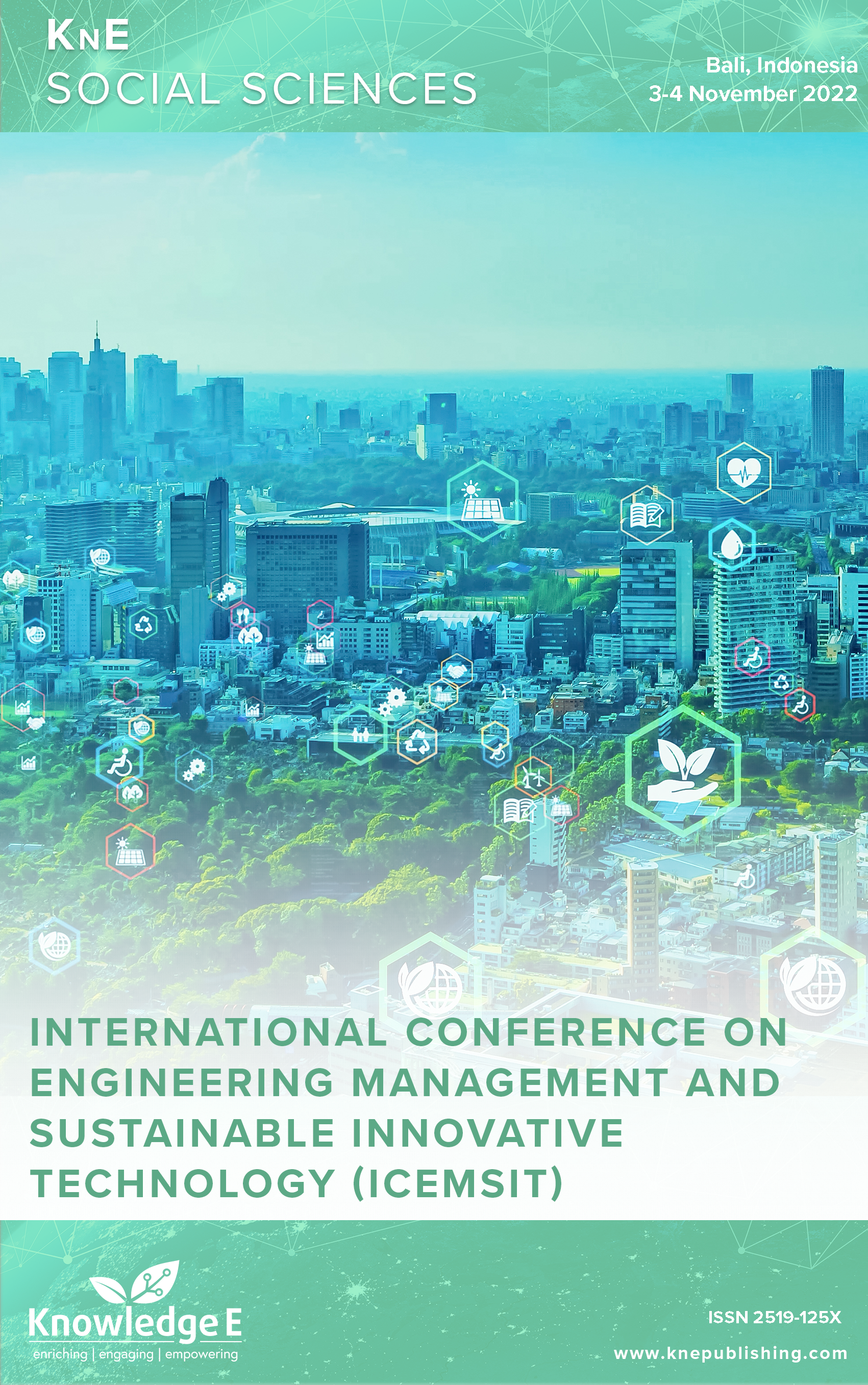Barriers to Knowledge Sharing: A Case Study of Construction Companies in Surabaya
DOI:
https://doi.org/10.18502/kss.v9i10.15737Abstract
Knowledge-sharing (KS) barriers prevent organizations from capitalizing on their skills and knowledge assets. This research aimed to investigate the main barriers to knowledge-sharing and identify the commonly used practice of the knowledgesharing process in the construction company in Surabaya. Data was collected by sending questionnaires to the top management of large contractors (Qualification B) in Surabaya. Fifty-four questionnaires were collected and considered eligible for analysis. The Relative Importance Index (RII) method was used in this research. The results showed that internet/social media, e-mail, and face-to-face interaction are commonly used for knowledge-sharing. The results also showed that the top barrier to knowledge sharing was the lack of top management support and participation. Meanwhile, the top personal barrier was difficulties in generalizing knowledge from one project to another project. This study helped to understand the main barriers to the knowledge-sharing process in construction companies and provided some practical guidance for companies to deal with these barriers. Moreover, this study helped top management to provide strategies to alleviate the barriers to knowledgesharing within their organization in order to achieve the success of construction projects.
Keywords: knowledge-sharing barriers, construction industry, knowledge-sharing practices
References
Ryan SD, Zhang X, Prybutok VR, Sharp JH. Leadership and knowledge management in an e-government environment. Adm Sci. 2012;2(1):63–81. DOI: https://doi.org/10.3390/admsci2010063
Issa RR, Haddad J. Perceptions of the impacts of organizational culture and information technology on knowledge sharing in construction. Constr Innov. 2008;8(3):182–201. DOI: https://doi.org/10.1108/14714170810888958
Al-Emran M, Mezhuyev V, Kamaludin A, et al. Development of M-learning application based on knowledge management processes. Proceeding 7th Int Conf Softw Comput Appl ICSCA 2018; 248–253. DOI: https://doi.org/10.1145/3185089.3185120
Girniene I, Atkociuniene Z. Impact of knowledge management processes on the creation of innovations: Case study. Proc Eur Conf Knowl Manag ECKM 2015; 0: 321–329.
Lapsomboonkamol S, Wiriyapinit M, Bhattarakosol P, et al. Motivational factors for knowledge sharing in Co-working spaces: co-working spaces in Thailand from the management perspective. Pertanika J Soc Sci Humanit. 2020;28:1835–54.
Chiang HH, Han TS, Chuang JS. The relationship between high-commitment HRM and knowledge-sharing behavior and its mediators. Int J Manpow. 2011;32(5/6):604– 22. DOI: https://doi.org/10.1108/01437721111158224
Aristanto D. Pengaruh Knowledge Sharing Terhadap Individual Innovation Capability Dan Kinerja Karyawan (Studi Pada Pt. Pln (Persero) Unit Induk Pembangunan Sulawesi Bagian Utara). J Ris Ekon Manajemen, Bisnis dan Akunt 2017;5:1539–1545.
Andra RS, Utami HN. Pengaruh Knowledge Sharing Terhadap Kinerja Karyawan (Studi pada Karyawan PT Bank Rakyat Indonesia Kantor Cabang Malang Kawi). J Adm Bisnis. 2018;61:30–7.
Erwina E, Mira M. Pengaruh Knowledge Sharing Terhadap Kinerja Karyawan Pada Perusahaan Air Minum (Pam) Tirta Mangkaluku Kota Palopo. JEMMA | J Econ. Manage Acc (Lond). 2019;2:75–81. DOI: https://doi.org/10.35914/jemma.v2i2.251
Wibowo MA, Waluyo R. Zhabrinna. Investigation Of The Relationship Between The Knowledge Management Process And Performance Of A Construction Company: An Empirical Study. Interdiscip J Information, Knowledge. Manag. 2018;13:417–35. DOI: https://doi.org/10.28945/4166
Riege A. Three-dozen knowledge-sharing barriers managers must consider. J Knowl Manage. 2005;9(3):18–35. DOI: https://doi.org/10.1108/13673270510602746
Wang L, Wang H, Wang K. The investigation analysis on knowledge-sharing barriers and incentives of university scientific research and innovation teams. In 2010 International Conference on Management and Service Science (pp. 1-4). IEEE. DOI: https://doi.org/10.1109/ICMSS.2010.5577008
Huang Q, Davison RM, Knowledge sharing barriers at the individual level in a Chinese bank. PACIS 2008 Proceedings, 150.
Khalil OE, Shea T. Knowledge sharing barriers and effectiveness at a higher education institution. Int J Knowl Manage. 2012;8(2):43–64. DOI: https://doi.org/10.4018/jkm.2012040103
Sik-wah Fong P, Chu L; Sik-wah Fong P. Chu L. Exploratory Study of Knowledge Sharing in Contracting Companies: A Sociotechnical Perspective. J Constr Eng Manage. 2006;132(9):928–39. DOI: https://doi.org/10.1061/(ASCE)0733-9364(2006)132:9(928)
Al-hakim LA, Hassan S. The Relationships among Knowledge Management Processes, Innovation, and Organisational Performance in the Iraqi MTS. Knowl Manag Int Conf 2012; 38–46.
Hussain ST, Abbas J, Lei S, Jamal Haider M, Akram T. Transactional leadership and organizational creativity: examining the mediating role of knowledge sharing behavior. Cogent Bus Manag. 2017;4(1):1–11. DOI: https://doi.org/10.1080/23311975.2017.1361663
Dulaimi MF. Case studies on knowledge sharing across cultural boundaries. Eng Construct Architect Manag. 2007;14(6):550–67. DOI: https://doi.org/10.1108/09699980710829012
Al Nahyan MT, Sohal A, Hawas Y, Fildes B. Communication, coordination, decisionmaking and knowledge-sharing: a case study in construction management. J Knowl Manage. 2019;23(9):1764–81. DOI: https://doi.org/10.1108/JKM-08-2018-0503
Kusuma FS. Devie. Analisa Pengaruh Knowledge Management Terhadap Keunggulan Bersaing dan Kinerja Perusahaan. Bus Account Rev. 2013;1:161–71.
Lo MF, Tian F, Ng PM. Top management support and knowledge sharing: the strategic role of affiliation and trust in academic environment. J Knowl Manage. 2021;25(9):2161–77. DOI: https://doi.org/10.1108/JKM-10-2020-0800
Filieri R. Overcoming knowledge sharing barriers through communities of practice: Empirical evidence from a big automotive supplier. Cambridge Scholars Publishing. 2010.
Yesil S, Hirlak B. An empirical investigation into the influence of knowledge sharing barriers on knowledge sharing and individual innovation behaviour. Int J Knowl Manage. 2013;9(2):38–61. DOI: https://doi.org/10.4018/jkm.2013040103

